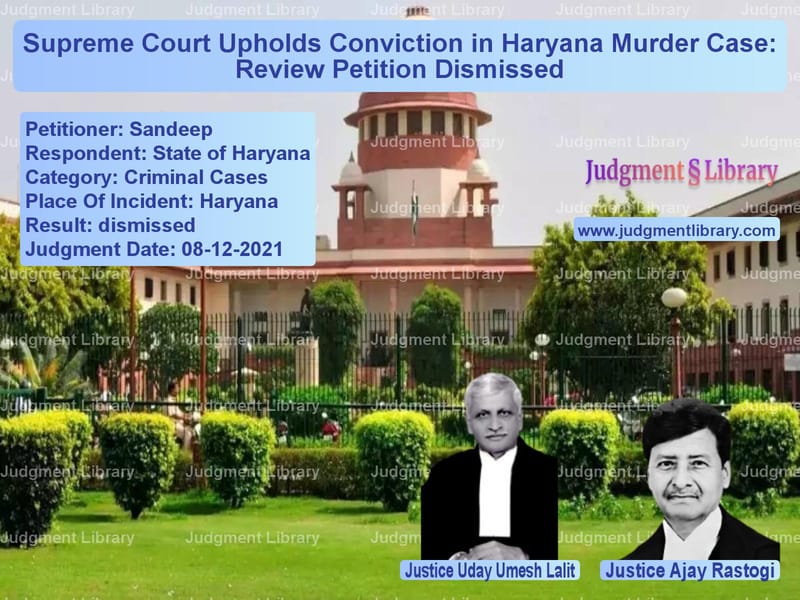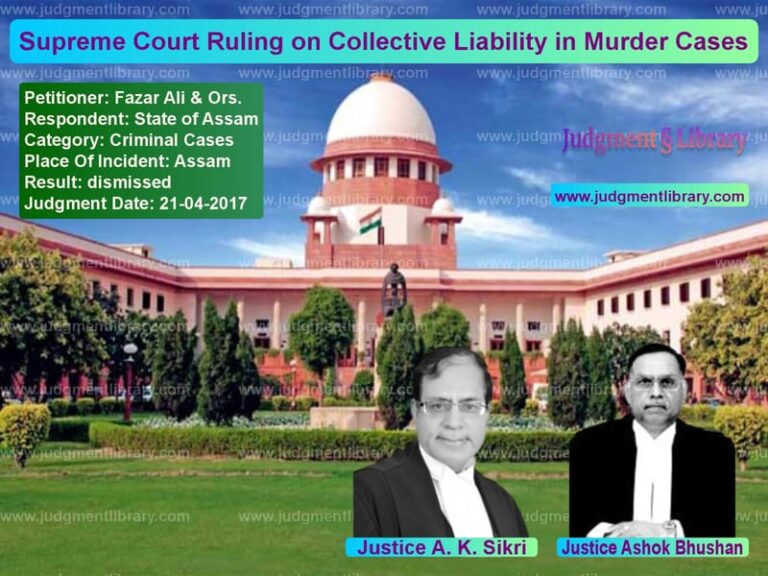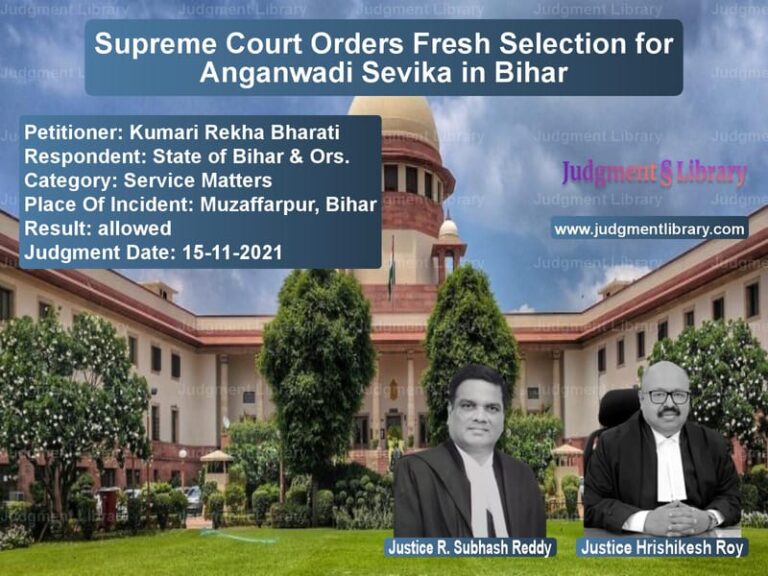Supreme Court Upholds Conviction in Haryana Murder Case: Review Petition Dismissed
The Supreme Court recently delivered a significant judgment in the case of Sandeep vs. State of Haryana, where it dismissed a review petition filed by the appellant challenging his conviction in a murder case. The Court found no apparent error in the earlier ruling and upheld the conviction, reinforcing the principle that a review petition cannot serve as a re-appeal.
Background of the Case
The case originates from a violent altercation in Haryana that led to the murder of the victim. The prosecution charged multiple individuals under various provisions of the Indian Penal Code (IPC), including:
- Section 302 IPC – Punishment for murder
- Section 34 IPC – Common intention
- Section 120B IPC – Criminal conspiracy
The Trial Court convicted all accused and sentenced them to life imprisonment. On appeal, the Punjab and Haryana High Court upheld the conviction of Sandeep and Pradeep but acquitted two co-accused, Krishna Devi and Ishwar, due to a lack of direct evidence.
Arguments Before the Supreme Court
Arguments by the Appellant
The appellant, Sandeep, filed a review petition challenging the Supreme Court’s earlier decision on the following grounds:
- The prosecution failed to establish his direct involvement in the murder.
- There were contradictions in witness testimonies that created reasonable doubt.
- Since two co-accused had been acquitted, the benefit of the doubt should also extend to him.
- There was no forensic evidence linking him to the crime.
Arguments by the State of Haryana
The prosecution opposed the review petition, arguing that:
- The Supreme Court had already thoroughly examined the evidence before upholding the conviction.
- The appellant had played an active role in the conspiracy and execution of the crime.
- The acquittal of co-accused Krishna Devi and Ishwar did not imply innocence for Sandeep.
- The review petition failed to show any error apparent on the face of the record, a prerequisite for review.
Supreme Court’s Analysis
Scope of Review Jurisdiction
The Court reiterated that a review petition is not an appeal and can only be entertained if there is an error apparent on record. The judgment stated:
“The grounds raised in the Review Petition do not make out any error apparent on record to justify interference.”
Acquittal of Co-Accused and Its Impact
The Court ruled that the acquittal of Krishna Devi and Ishwar did not automatically lead to relief for Sandeep. It noted:
“Each accused must be judged based on their own role in the crime. The prosecution has sufficiently proved Sandeep’s involvement.”
Contradictions in Witness Testimonies
The Court reviewed alleged inconsistencies in witness accounts and found them immaterial:
“Slight variations in witness testimonies are natural. They do not affect the overall reliability of the prosecution case.”
Final Judgment
The Supreme Court dismissed the review petition, stating:
- The previous judgment had already considered all relevant facts and circumstances.
- The conviction of Sandeep and Pradeep was based on substantial evidence.
- The acquittal of the other accused did not warrant the same relief for Sandeep.
Key Takeaways from the Judgment
- Limited Scope of Review: A review petition cannot be used as a second appeal; it must demonstrate an apparent error in judgment.
- Judicial Consistency: The Court upheld the importance of finality in legal proceedings, refusing to reopen a case without compelling reasons.
- Independent Assessment of Accused: The Court emphasized that acquittal of some accused does not automatically lead to relief for others.
- Finality of Criminal Convictions: The judgment reinforced the principle that once evidence is thoroughly analyzed, further reconsideration is unnecessary without substantial new grounds.
Implications of the Judgment
This ruling clarifies the legal principles governing review petitions in criminal cases. It sets a precedent that:
- Review petitions must present a clear and apparent legal error.
- Acquittal of co-accused does not automatically imply acquittal for all.
- Credibility of prosecution evidence is not reconsidered unless there is fresh and substantial proof.
Conclusion
The Supreme Court’s decision underscores the need for strong, indisputable grounds to justify a review petition. The dismissal of Sandeep’s plea reaffirms the principles of legal finality and the limited scope of judicial review in criminal convictions.
Petitioner Name: Sandeep.Respondent Name: State of Haryana.Judgment By: Justice Uday Umesh Lalit, Justice Ajay Rastogi.Place Of Incident: Haryana.Judgment Date: 08-12-2021.
Don’t miss out on the full details! Download the complete judgment in PDF format below and gain valuable insights instantly!
Download Judgment: sandeep-vs-state-of-haryana-supreme-court-of-india-judgment-dated-08-12-2021.pdf
Directly Download Judgment: Directly download this Judgment
See all petitions in Murder Cases
See all petitions in Bail and Anticipatory Bail
See all petitions in Judgment by Uday Umesh Lalit
See all petitions in Judgment by Ajay Rastogi
See all petitions in dismissed
See all petitions in supreme court of India judgments December 2021
See all petitions in 2021 judgments
See all posts in Criminal Cases Category
See all allowed petitions in Criminal Cases Category
See all Dismissed petitions in Criminal Cases Category
See all partially allowed petitions in Criminal Cases Category







